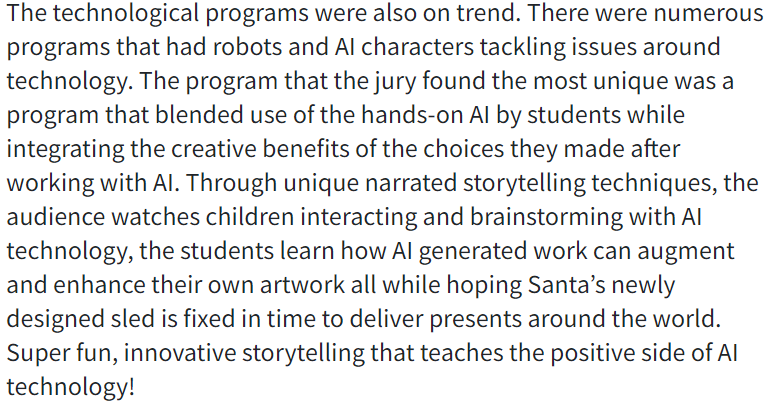I feel we’re standing on a precipice. Only… not many of us are aware that we are.
Over the past few months I (and we) have been producing a lot with AI. The 24 episode series we did with indigenous Sami school children from Sweden – where we augmented the children’s creativity with AI for Swedish Television – was selected a finalist in this year’s Prix Jeunesse. The jury said the following:

It’s only four months since the premiere of this series and I already feel it’s a bit dated. The speed at which we’re moving at the moment feels exponential. We’re applying AI solutions to many other projects we’re working on at the moment, and it’s tempting to just wait that liiiiittle bit longer for new solutions to appear that will make our workflow easier, our content better and our end product more engaging.
If you missed it, OpenAI’s blog post the other week about what impressions the creators who were selected to test out Sora, the text-to-video AI solution, had. The examples in the blog post are stunning. Yeah, there are artefacts and a bit of uncanny valley here and there but on the whole…. Wow. However, the interview with the team from Shy Kid, who created the “Air Head” video, clearly shows that editors won’t be out of a job immediately. Lots and lots of editing to get it to the level it’s at.
Still – remember that thing about how AI is evolving almost exponentially? I have a difficult time imagining where we will be in a year’s time and how AI by then will have managed to rearrange society.
Just a couple of weeks ago I helped a regional newspaper test AI imagery and how well people see what is false and what is factual. Even journalism students, knowing they were tested on AI images, failed to identify many of the AI images presented.
Overall 4700 people did the newspaper’s online test, and overall they got 13 / 18 images correct. These were people who knew they were doing a test with a 50/50 chance of getting it right – still they failed.
So this precipice I was talking about? Well, first I think we’re going to see a big shift in media. We already have Tiktok-influencers with ten times more views than the largest broadcasters. We already have YouTubers with a following that dwarfs most traditional newspapers or channels. Put something like Sora in the hands of tens of thousands of people globally whose only barrier to not producing content is learning to use the equipment (or even be able to afford equipment) and we’re going to see fireworks.
Secondly, people need to become much more aware. Nothing can be taken as factual. Not unless it’s been vetted and spoken for by someone or something that you have a very high degree of confidence in – and even then it probably pays to be sceptical.
Are we, then, entering an era of utter cynicism, disbelief and false information? To a certain degree, yes. The change in how we view the world will come quicker than most of us think, and be more thoroughly shaping our perceptions than we ever could imagine. You only have to be fooled by a few posts and images on Facebook to have your belief in the world around you be altered forever.
I’ve played around with Suno.ai, a fantastic AI powered music creation engine. I’ve heard the talk about the next service, Udio, already called the “Suno-killer” and reportedly 2-10 times better. This, again, will shape how we see the world – most of us could never hope to write a good song, nevermind recording it and releasing it. The stuff you can get from Suno today in 45 seconds is of a quality that most people would find acceptable – and in many cases it’s even opening up the possibilities of creating fun, weird, strange and utterly enthralling musical content. The things just now being leaked from Udio are even better. (Update: as of two hours of me publishing this blog post, Udio is now open for Beta testing at udio.com)
Is this then the end for music and humans? And are the previous examples marking the end of film and humans, of photography and humans, of art and humans?
I would still argue that this is not the case. On the contrary, I nurture a hope that all of this will lead to a counter-movement, where authentic human connections will be of increasing worth to the average person. Seeing a live band together with your friends will be worth so much more than listening to a playlist of AI-generated music on Spotify. Taking pictures of you and your loved ones doing something together will trump all gorgeous AI-generated imagery. Real connections with real people with real intent and real consequences.
I hope.
